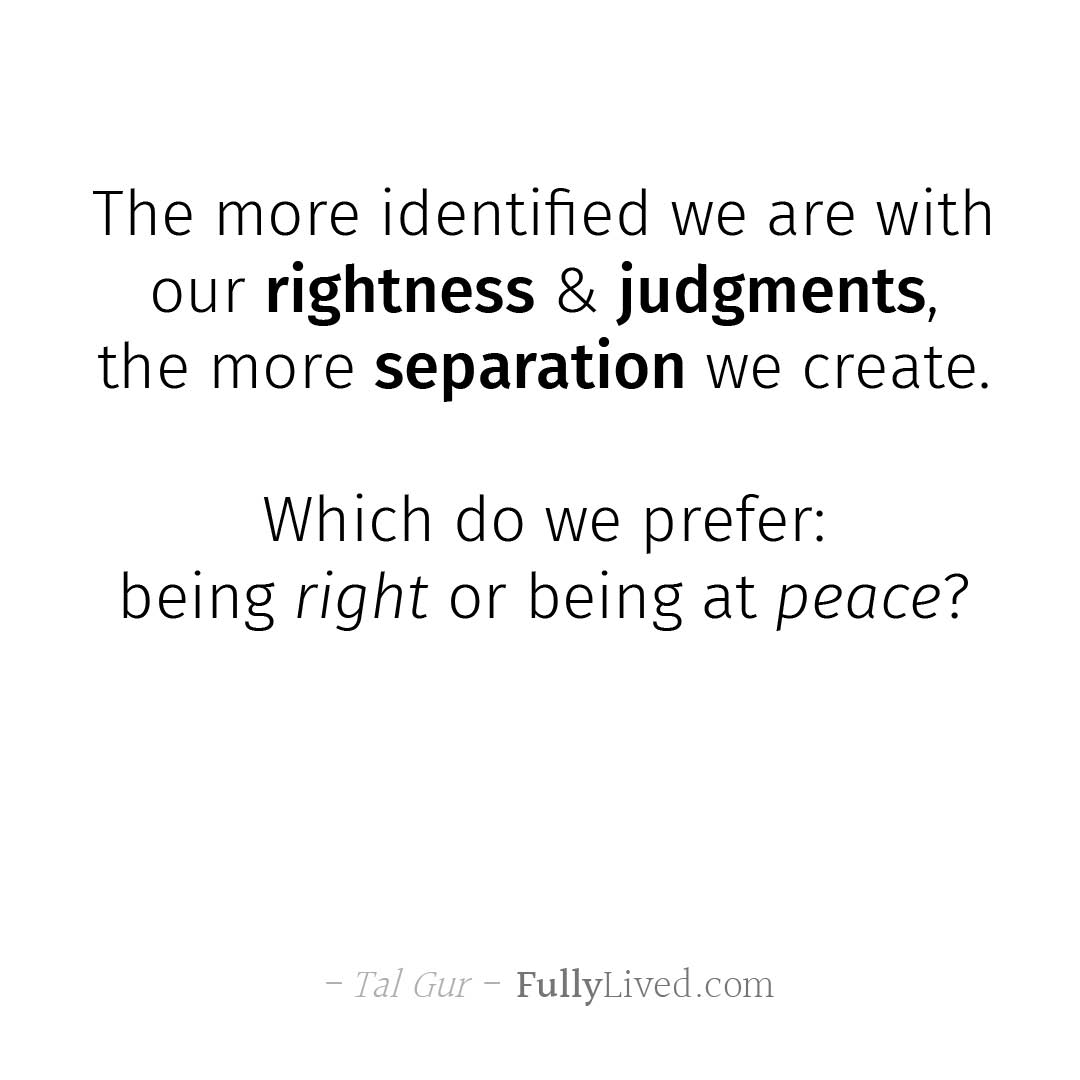The more identified we are with our rightness & judgments, the more separation we create. Which do we prefer: being right or being at peace?
Imagine a crowded room where everyone is engaged in a heated argument, each person vehemently convinced of their own righteousness. Voices rise, egos clash, and the air crackles with tension. In the midst of this chaos, a simple question emerges: "Which do we prefer: being right or being at peace?"
This question strikes at the heart of human nature, challenging us to reconsider our priorities and values. It highlights the subtle yet profound difference between the pursuit of truth and the need to assert our own opinions. Often, we cling fiercely to our convictions, seeing them as badges of honor that define our identity. But in our quest to prove ourselves right, we unwittingly sow seeds of discord and division.
Think of it like this: Imagine you're holding onto a rope, one end tethered to your belief in being right, and the other end tied to your sense of peace. As you pull harder in the direction of righteousness, you find yourself drifting further away from tranquility. The more you insist on your own correctness, the tighter the knots become, binding you to a cycle of conflict and unrest.
But what if you were to loosen your grip on that rope? What if, instead of clinging stubbornly to your convictions, you were to open yourself to the possibility of peace? In doing so, you release the tension that binds you, allowing yourself to float freely in the calm waters of acceptance and understanding.
Picture a sailboat navigating stormy seas. When the captain stubbornly insists on steering a fixed course, regardless of the changing winds, the vessel becomes trapped in a relentless battle against the elements. But when the captain learns to adjust the sails, to adapt to the shifting currents, the boat glides gracefully over the waves, finding harmony amidst the chaos.
Similarly, when we let go of our attachment to being right, we open ourselves to a deeper truth—the truth of connection and compassion. Instead of erecting barriers of judgment, we build bridges of empathy, reaching out across the divides that separate us. In this space of openness, conflicts dissolve, and understanding flourishes, paving the way for genuine reconciliation and harmony.
Consider the analogy of a puzzle. Each person holds a piece, unique in shape and color, yet essential to completing the picture. When we fixate on our own fragment, insisting that it alone holds the key to the whole, we miss the beauty of the larger mosaic. But when we step back and embrace the diversity of perspectives, we see how each piece contributes to the richness of the tapestry, creating a masterpiece far greater than the sum of its parts.
So, as we reflect on the question posed to us—“Which do we prefer: being right or being at peace?”—let us remember that true wisdom lies not in the certainty of our convictions, but in the humility of our hearts. Let us strive not to dominate, but to understand; not to conquer, but to connect. For in the end, it is not our righteousness that defines us, but our capacity for compassion and kindness.
Now, I invite you to ponder: In your own life, when faced with conflicts or disagreements, do you find yourself clinging to the need to be right, or are you willing to seek peace? What small steps can you take to prioritize harmony over righteousness in your interactions with others?
* To gain more inspiration and motivation for your personal growth journey, I recommend visiting my SMART goals page, which offers a wide range of goal ideas to help you establish new aspirations and achieve greater success in life. This list was crucial in the development of my own life goals list, consisting of 100 goals that I pursued for ten years.
Chief Editor
 Tal Gur is an author, founder, and impact-driven entrepreneur at heart. After trading his daily grind for a life of his own daring design, he spent a decade pursuing 100 major life goals around the globe. His journey and most recent book, The Art of Fully Living, has led him to found Elevate Society.
Tal Gur is an author, founder, and impact-driven entrepreneur at heart. After trading his daily grind for a life of his own daring design, he spent a decade pursuing 100 major life goals around the globe. His journey and most recent book, The Art of Fully Living, has led him to found Elevate Society.























